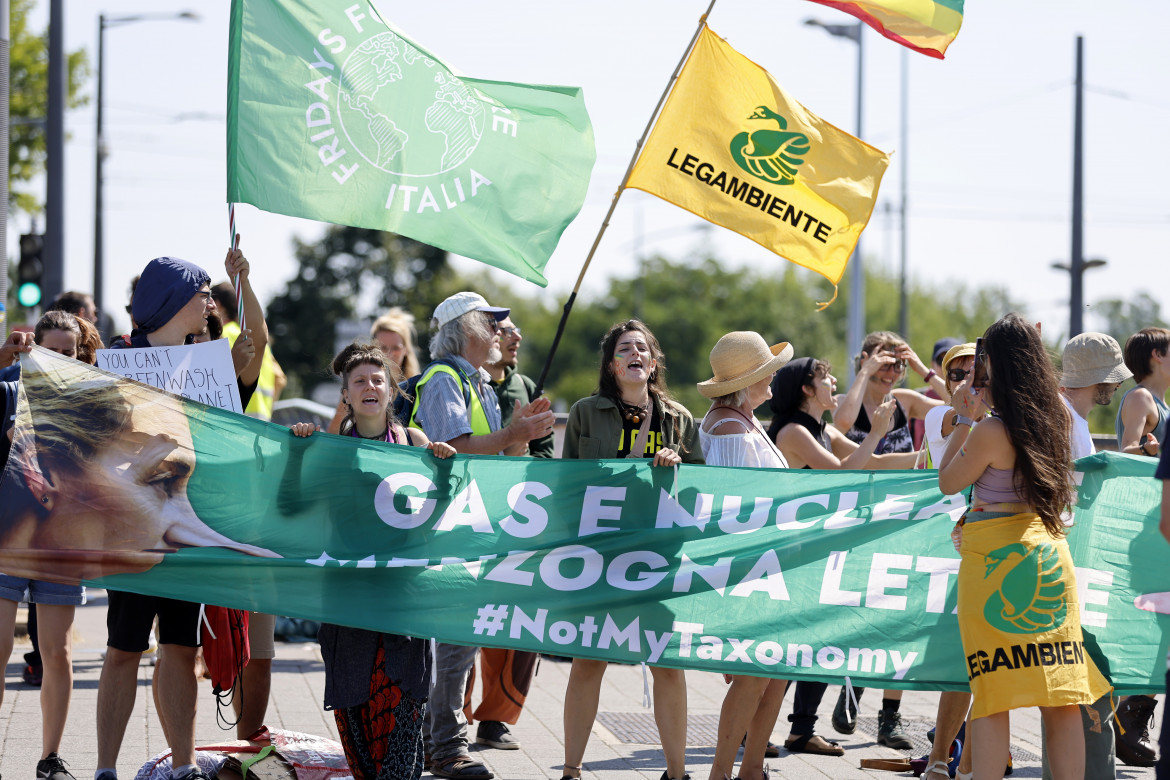Analysis
EU labels gas and nuclear as ‘sustainable,’ betraying climate promises
The taxonomy is the result of a ‘Faustian pact’ between France and Germany: the latter, anti-nuclear, has traded Paris’s support for gas for support for French (and Eastern European) nuclear power. A gift to Putin, Greenpeace says.

It is a “disgrace,” a “scandalous result,” but “the struggle continues.” Green, left-wing and environmental organizations have strongly criticized the result of Wednesday’s vote in the European Parliament, which rejected, by 328 votes to 278 and 33 abstentions, the “objection” – which amounted to a veto – against the inclusion of gas and nuclear in the Renewable Energy Taxonomy, at least as a transition, that had been put to the European Parliament’s Envi committee on June 14.
As the veto failed, the Commission’s text presented in January was approved, which deems certain investments for energy production in CO2-neutral nuclear power plants built until 2030 (and adopting a protocol for greater safety from 2025 and plans for waste storage from 2050) as “sustainable.” Also accepted are gas-fired power plants, provided they use the latest technology and allow the closure of even more polluting coal-fired plants.
The story does not end there, however: Austria and Luxembourg intend to go to the European Court of Justice, a court case that will be joined by various oppositions. The European Council will need to approve the Commission’s line, but there is opposition from eight countries (not enough, however, for a qualified majority that would block the decision).
The Commission on Wednesday assured that it “remains determined to use all available instruments to move the EU away from carbon-intensive energy sources.” In these hours, the focus of the Commission and member states is all on the Russian threat to turn off the gas tap, and ecological concerns are taking a back seat.
In mid-July, Moscow announced “repairs” to the Nord Stream 1 pipeline, which for Germany means a gas blockade that is expected to last two weeks, but could be extended indefinitely, as Putin’s “weapon.”
President Ursula von der Leyen reminded everyone on Wednesday that we must prepare for “more cuts” from Russia. The EU has launched six sanctions packages; in mid-August, the embargo on Russian coal goes into effect, and the one on oil at the end of the year. On gas, the EU has not yet decided anything, but it is suffering from Moscow’s blackmail.
Greenpeace reminded on Wednesday that including gas in the taxonomy means giving a gift to Putin: that’s at least four billion euros a year for Moscow to finance the war in Ukraine, 32 billion until 2030. The strengthening of the dollar against the euro and rising energy prices also help to fill the Russian coffers.
According to the chairman of the Envi Commission, Frenchman Pascal Canfin (Renew), environmentalists’ “fears” about the taxonomy “are not justified”: “Gas and nuclear are not put on the same level as renewables” and “precise conditions” are defined for their use.
But for the Greens, the taxonomy is the result of a “Faustian pact” between France and Germany: the latter, anti-nuclear, has traded Paris’s support for gas for support for French (and Eastern European) nuclear power. “By keeping gas and nuclear as sustainable in the taxonomy,” the S&D group says, the conservatives have shamefully betrayed the EU’s climate ambitions.
Socialists hope global finance will turn its back on fossil fuels. Greta Thunberg also spoke on the vote, citing only the case of gas, which “delays the truly durable transition and reinforces dependence on Russian hydrocarbons.”
At the EU level, a whole “climate package” is on the table, a Green Deal presented a year ago by the Commission, ranging from the European Trading System (ETS) to a carbon tax at the EU’s external borders to avoid “importing” CO2 and opportunistic offshoring, to a ban on gasoline cars in 2035. There is agreement to reduce greenhouse emissions (Fit for 55, i.e. minus 55 percent by 2030, with carbon neutrality in 2050), but the closer we get to translating the goal into practice, the more strongly the lobbies are emerging.
In France, Prime Minister Elisabeth Borne, in her address to Parliament on general policy, announced the nationalization of EDF, the historical energy operator (where the state already controls 83.8 percent of the capital): the company is in trouble because of the rising costs of nuclear power, with about half of its reactors shut down for maintenance.
Originally published at https://ilmanifesto.it/la-tassonomia-verde-diventa-grigia-gas-e-nucleare-come-le-rinnovabili on 2022-07-07
